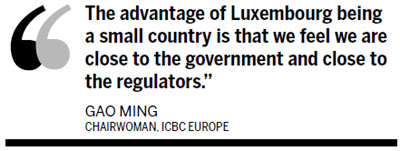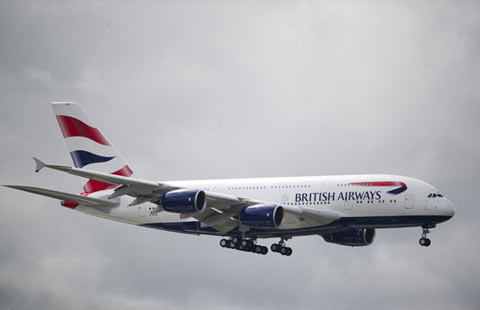Gateway to Europe
Updated: 2014-03-17 07:23
By Cecily Liu (China Daily)
|
||||||||
ICBC bullish on yuan business growth in land-locked nation
Industrial and Commercial Bank of China Ltd, the world's largest bank by market capitalization, is relying on the favorable investment climate in Luxembourg to provide the cushion for its expansion plans in Europe, a top bank official says.
"Luxembourg is an important financial center in Europe, with efficient regulations, obvious geographical advantage and a government that readily welcomes foreign investment into the country," says Gao Ming, chairwoman of ICBC Europe.
|
Gao Ming, chairwoman of ICBC Europe, says that Luxembourg's central location facilitates the flow of financial services industry talent. Cecily Liu / China Daily |

According to Gao, Luxembourg is not only the largest investment fund center in Europe, but also a leading destination for private banking in Europe. This was also the reason why the bank chose the grand duchy to be its European headquarters, she says, adding that it now also has a presence in seven other European cities.
"The advantage of Luxembourg being a small country is that we feel we are close to the government and close to the regulators. If the regulators require anything from us, they will tell us. If we have any questions for the regulators, they will answer fast," Gao says.
She says that Luxembourg's central location facilitates the flow of financial services industry talent and also improves the city's competitiveness. Through the speedy implementation of European Union directives, Luxembourg has also ensured that there is adequate investment protection.
Gao feels that the biggest draw for Chinese lenders is that being a part of the Schengen area of 26 European countries, the company employees based in Luxembourg can easily travel to other Schengen countries for business.
ICBC first had a presence in Luxembourg in 1998 as a representative office, which was quickly upgraded to a branch in 1999. In 2006, ICBC established a subsidiary in Luxembourg in order to prepare for the bank's expansion to other European countries using the EU's Single Passport policy.
In January 2011, ICBC established five European branches, in Paris, Amsterdam, Brussels, Milan and Madrid. At the same time, ICBC (Luxembourg) SA changed its name to ICBC (Europe) SA, to signify its position as the bank's European headquarters.
"At that time, Europe was still under the shadows of the financial crisis with a heavy atmosphere. The opening of the five ICBC branches really helped bring hope," Gao says.
The five branches quickly grew and all of them achieved profits in the first six months of their operation ending in June 2011. Having achieved success, ICBC then established its Warsaw and Barcelona branches in November 2012.
Gao says ICBC Europe now employs a strong team of 300 people, of which 80 are based in Luxembourg. In addition, ICBC also has a branch in Frankfurt and a subsidiary in London. Although both entities are managed by ICBC's head office in Beijing, they cooperate with ICBC Europe extensively for businesses on a daily basis.
In 2012, ICBC also established three centers, focusing on cash management, private banking and investment banking respectively. All three centers are located in Paris, a city frequently visited by delegations of Chinese outbound businesses.
Gao says the establishment of these centers signifies a milestone for ICBC Europe, expanding the bank's business focus beyond traditional retail and commercial banking activities such as deposits, loans and trade finance.
She says one factor behind ICBC Europe's focus on investment banking is the growing number of Chinese outbound merger and acquisition deals in European countries in recent years.
"We can help to provide financial consultancy to Chinese companies at early stages of the M&A process, followed by services such as evaluating the cost of the M&A activities once a target is found. We also help clients structure a deal. In the post M&A stage, we offer clients commercial banking services," Gao says.
ICBC Europe's private banking service has helped many of ICBC's existing clients, who are high-net-worth individuals, to invest in Europe. Investment options range from real estate and luxury products to acquisitions of small businesses, for example, vineyards. It also helps Chinese clients manage immigration into Europe through the investment route.
ICBC Europe has also helped European clients to invest in renminbi products and opportunities in China and has been closely working with the team in Beijing on new yuan products, Gao says.
More opportunities are in the offing in line with the rapid internationalization of the Chinese currency in recent years, she says, adding that investors in overseas financial centers such as Luxembourg can now invest in overseas and domestic renminbi products.
An ideal example of opportunities emerging in recent years is the Renminbi Qualified Foreign Institutional Investor scheme, launched by the Chinese government in 2011, which allows overseas institutional investors to invest in China's financial markets.
Such opportunities have sparked the interest of many Western financial centers, including Luxembourg, London, Frankfurt, Paris and Switzerland. To compete for such opportunities, financial services companies in each center are now keenly developing renminbi products and services, she says.
London, for example, received an RQFII quota of 80 billion yuan ($13.02 billion) last year, agreed during British Chancellor George Osborne's visit to China. Luxembourg's Finance Minister Pierre Gramegna recently expressed confidence that he would be able to clinch an RQFII deal during his upcoming China visit.
Aside from the government efforts, private players in Luxembourg and other cities are also quickly warming to new renminbi products and services and ready to prove their capabilities and generate revenue from the investment opportunities, Gao says.
ICBC Europe helps many Chinese and European traders to finance and invoice their transactions in the renminbi currency. It also helps businesses to manage their offshore renminbi accumulated as a result of business transactions.
ICBC Europe, Gao says, also helps European companies to issue renminbi bonds and cites the example of the 750 million yuan renminbi bond its client Renault SA issued last year, along with ICBC Asia in Hong Kong.
Other examples of cross-border renminbi services ICBC Europe provides include renminbi deposits, loans, foreign exchange and derivatives trading, remittances and liquidity support for renminbi accounts.
ICBC Europe's revenue from renminbi businesses has grown to 35 percent of its total profits for the year ending Dec 31, 2013, as a result of high demand for yuan businesses in Europe. Nearly 24 percent of ICBC Europe's assets are now denominated in renminbi, say bank officials.
In 2011, ICBC Europe became the first European-domiciled bank to be approved by the People's Bank of China to enter the China Inter Bank Bond Market.
Cecily.liu@chinadaily.com.cn
(China Daily 03/17/2014 page14)

 Crimeans start celebrating pending referendum outcome
Crimeans start celebrating pending referendum outcome
 European universities growing in popularity among students
European universities growing in popularity among students
 Muslims in Malaysia pray for missing plane
Muslims in Malaysia pray for missing plane
 Ukraine's Crimea kicks off referendum
Ukraine's Crimea kicks off referendum
 Travel-tourism forum advises US to 'loosen' visa requirements
Travel-tourism forum advises US to 'loosen' visa requirements
 Nose gear on plane collapses at Philly airport
Nose gear on plane collapses at Philly airport
 US Black Sea naval drills start near Crimea
US Black Sea naval drills start near Crimea
 Cooperation at the heart of win-win, Li tells world
Cooperation at the heart of win-win, Li tells world
Most Viewed
Editor's Picks

|

|

|

|

|

|
Today's Top News
US not to recognize Crimean referendum
Missing jet pilots' motive probed
Alibaba opts for IPO in US
Stronger cop presence urged after knife attacks
Crimea kicks off referendum
Kindergarten closed for drug use
Xi stresses building of strong army
Dispute triggered knife attack in C China
US Weekly

|

|







